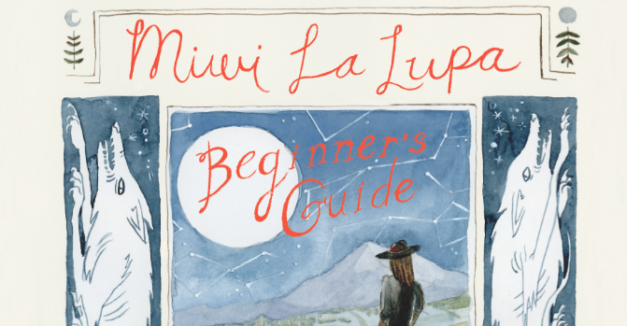In March, when I asked MiWi La Lupa how he named his second album, Ended Up Making Love, he replied that “love is the supreme goal, isn’t it?” Three months after finishing recording Love, La Lupa went back into the studio. The Omaha singer-songwriter’s follow up, Beginner’s Guide, finds La Lupa still focused on the ideas presented in Love. Even in the face of things like unstoppable change and depression, La Lupa’s songs turn to his fellow man for comfort.
La Lupa’s sweet voice comes in over an acoustic guitar on Beginner’s Guide’s first and title track. A faraway wolf howl precedes the track and narration from Robert Redford’s The Language and Music of the Wolves drones in. Like a kickstarted motor, a guitar suddenly rushes in and the music gets underway.
While Ended Up Making Love showcased more of a blend of rock and folk, Guide — out now on La Lupa’s new label Tigershrimp Records — lends itself more to a subtle type of songwriting. La Lupa’s voice sounds more mature, less urgent and more calm. It blends nicely on “Beginner’s Guide” as he sings about moving around, charting unknown territory, ready for changes. This is an idea that was prevalent on his last album as well. He sounds like a man who is not quite content, but not upset with where he is either. He is a wolf, moving to survive.
The second track, “A Little Bit of Both,” is arguably the catchiest on the album. It finds La Lupa pondering how he wants both “addiction/sobriety/my privacy/notoriety.” In a world full of technology and limitless connection, the song continually puts forth the question of how much is too much. The song almost begs to be danced to, to allow people to let loose, to show their wild sides.
A prophetic song in its own right, the third track “Plagued By Rules” plays out with lamentation and fear, but ends with the acceptance of reliance on others. La Lupa sings about love being “a scepter.” The song is a testament to the necessity to the evils around us, about how people would be “goners” if they don’t follow these ambiguous rules. The song ends with La Lupa sounding tired, in an almost exhausted wail:
If she wasn’t plagued by rules/She’d be a goner/Goner, for sure/If she wasn’t raised by wolves/She’d be a goner/Goner for sure
The fourth track, “Overcast Man,” continues the trend of finding hope in others during times of depression. Abstract problems have concrete solutions, most commonly those people around you. But it isn’t just people who are the answer, but the right people. Oddly, this goes against the idea of the wolf being a solitary figure, staying away from man to preserve himself. The point is not that the wolf needs to be isolated, but that he needs to find the right ones to be in his pack.
As La Lupa’s record continues with the song “Refreshments,” listeners hear a strange mix of maturity and innocence fighting against each other. Its narrator sings about “mother versus father nature’s brawl.” The ending of the song considers how the “radiance of true love” is understood, as if the innocence has worn off and the Truth has washed over, the capital-T truth, the loss of ignorance.
The second-to-last song, “Bright Side,” sounds less innocent than “Refreshments,” but still offers the same hope. Beginning with a scene of betrayal, the song flutters between being cautious of those around you while lighting a candle to find someone with which to share your light. The lyrics speak to finding comfort in the outlaws and outsiders, drifting away from the mainstream, like the wolves that frequently howl throughout the album. The record ends with the sweet duet, “If You Let Me,” a simple song about falling in love. It’s an interesting choice for the ending of the record. The narration promotes an idea of isolation, although the songs promote finding strength in the people around you.
Throughout the record, one thing is certain: love is the overwhelming force that La Lupa encourages. The world is a frightening place and may often make people want to rescind inside themselves like the wolves that are so often alluded to on this record. However, the hope is in our fellow man and the help lies there.





